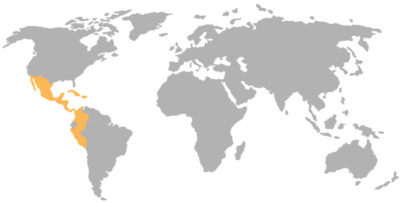The Integrated Rural Development and Productivity Project (ProOccidente), led by ACDI/VOCA, is a five-year initiative implemented in partnership with Honduras’s Secretariat of Agriculture and Livestock (SAG). Funded by the Inter-American Development Bank (IDB) and the Spanish Agency for International Development Cooperation (AECID) through the Fund for the Promotion of Development (FONPRODE), ProOccidente aims to boost the incomes of rural families in the Honduran Dry Corridor, a food producing region in western Honduras prone to extreme weather.
ProOccidente works with local producers, producer groups, the private sector, indigenous organizations and small and medium enterprises to ensure the sustainability of efforts to build economic and climate resilience in the Honduras dry corridor, reduce migration out of the country and promote self-reliance through local ownership.
ProOccidente is providing technical assistance and training to 10,000 agriculture and livestock producers across six departments and 88 municipalities by helping them adopt new climate-smart technologies and practices and improving their access to finance. Working closely with the Honduras’ Forestry Conservation Institute and local organizations, the project will develop management conservation plans for 25 micro-watersheds, ensuring good water governance in the communities and sustainable access to clean drinking water and irrigation.
Activities take place in the western departments of Santa Bárbara, Copán, Ocotepeque, Intibucá, Lempira and La Paz, focusing on horticulture, fruit, coffee, cacao, dairy cattle, and those related to cultural products of ethnic origin.
Project Objective
- The objective of the project is to sustainably increase the incomes of 15,000 rural households in the Dry Corridor of Honduras by improving agricultural productivity through new technology, training, and access to finance.
Sample Activities
- Provide training and technical assistance to agriculture and livestock producers on the use of new technologies, including climate-smart practices, to boost productivity, sales, and incomes.
- Provide financial support to producers to help finance their investment in improved technologies.
- Establish relationships among local groups, including municipal governments and non-profits, to manage micro-watersheds sustainably, now and in the future.
- Provide nutritional and health assistance to families in the region, with a focus on women and youth.
- Strengthen the linkage of small producers with markets, input suppliers, service providers, and other value chain actors.
Anticipated Results & Current Progress
ANTICIPATED results
Current Progress*
Boosting Incomes
- Raise 15,000 households above the median poverty line.
- Provide 4,000 agricultural producers with access to new products or economic markets.
- Help 243 businesses increase sales and net incomes.
- Created 132 investment plans for 4,095 agricultural producers.
- Provided 1,030 agricultural producers with access to new products or economic markets.
Promoting New Technologies
- Promote the use of new technologies on 5,640 hectares of farmland.
- Develop 25 micro-watershed management plans, for 25,000 hectares of farmland.
- Provide 5,000 producers with access to weather information.
- Provide climate-smart technologies to 10,000 agricultural producers.
- Facilitated the purchase and delivery of new technologies (planters, sprayers, greenhouses, solar panels, and irrigation systems) to nearly 1,000 agricultural producers.
- Developed watershed management plans for 18,307 hectares of farmland.
Providing Training
- Train 10,000 agricultural producers in six departments and 88 municipalities.
- Provide 6,000 rural families with nutrition assistance.
- Conducted 4,310 trainings, reaching over 10,733 individuals.
- Assisted 8,302 rural families with nutrition and health.
- Supported the cultivation of 7,798 hectares of coffee, grain, vegetable, and fruit pastures in the zone of influence.
Improving Access to Finance
- Train 15,000 producers to better manage their financial credit.
- Facilitated access to credit for 5,840 agricultural producers.
*As of March 2025
Anticipated Impact
- Higher Economic Growth and Lower Migration: Honduras is one of the main countries of origin for unauthorized immigrants coming to the U.S. By creating better systems and economic growth in western Honduras, the project will have long-term implications for reducing the perceived need to migrate out of the country for economic and climate-related reasons. By raising Honduran households above the poverty line, the project will help families remain in the Dry Corridor.
- Safety and Stability: A thriving economy generally contributes to a more stable country with a reduced risk of social and political unrest. By lifting families out of poverty and helping small businesses increase sales and access loans and investments, the project indirectly fosters stability in the region.
- A Self-Reliant Country: Because ProOccidente is a contract with the Government of Honduras, it benefits from local investment and ownership—key drivers of long-term, sustainable development. The project works to envision a Honduras free from reliance on future foreign aid.
- Food security and market linkage: If eligible producers living in poverty adopt climate-smart technologies, better agricultural practices, and strengthen their productive skills, they can achieve commercial production levels, meet their food security needs, and sustainably lift themselves out of poverty. This project strongly p
Project Leadership
Chief of Party: Eduardo Chirinos







